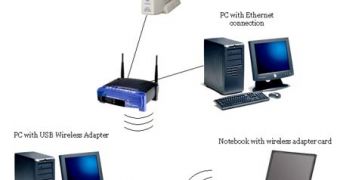Wired networks created the World Wide Web and helped unite and connect millions of users, desktops, laptops and servers and now the wireless networks are helping keep all those connections alive and well even while on the move. An IT analyst group claims that the wired networks are going slowly extinct, being replaced by the easier to use wireless standards that are almost as fast and reliable and also offer the mobility advantage.
According to the news site news.com a report written by Burton Group compares the popularity and growth rate of the wired gigabit Ethernet standard networks over the latest version of the wireless protocol 802.11n enabled networks. An analyst from the said firm, Paul DeBeasi, said that the main advantage of the wireless network is the mobility it offers to its users and that "IT professionals should start thinking now about how they will deploy, maintain, and benefit from an all-wireless LAN". In that report, it is suggested that the wireless protocol that is in almost final form will gain a serious advantage over the Ethernet within 24 to 36 months.
The analyst reports a growing number of laptop users and the huge increase in mobile applications including the one that supports voice over Internet Protocol, or VoIP, as the leading cause to 802.11n's growth in popularity. "One can analyze the differences between 802.11n and Ethernet with regard to performance, security, manageability, cost and impact on staff," said DeBeasi. "However, the definitive and unalterable competitive advantage that 802.11n has over Ethernet is pervasive mobility." While the wired traditional networks may still provide a security bonus to their users, the recent advances in radio waves technologies are making the wireless protocol a more secure standard than it used to be. As the latest version of the 802.11n gains more data transfer speed as well as higher range and bandwidth, the only definitive advantages of the wired networking standard are slowly fading away.
Even if the definitive form of the latest wireless standard will only be approved in 2009, a number of consumer-oriented products are already on the market and a specialized, non profit organization, the Wi-Fi Alliance, is certifying hardware systems against the available 802.11n specifications.

 14 DAY TRIAL //
14 DAY TRIAL //